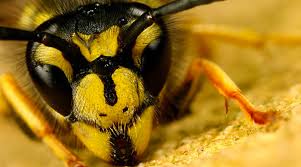Brazilian Wasp Venom Peptide Kills Cancer Cells While Not Harming Normal Cells

A recent study[1][2] in the Biophysical Journal has shown the Brazilian wasp’s (Polybia paulista) venom to have anti-cancer properties. The wasp’s venom contains a peptide called MP1 (Polybia-MP1) that specifically targets and kills cancer cells, leaving normal cells unharmed.
MP1 works by making holes in the membrane of cancer cells. Two lipid substances on cancer cells make cancer cells vulnerable to MP1. Cancer cells have phosphatidylserine (PS) and phosphatidylethanolamine (PE) lipids on the surface of its cell’s membrane..
The position of these two compounds on the outside of the cell membrane is what makes cancer cells susceptible to MP1. In normal cells the phosphatidylserine (PS) and phosphatidylethanolamine (PE) are on the inside of the cell membrane facing the inside of the cell.
When MP1 comes in contact with the phosphatidylserine (PS) it creates a bound with it, while MP1’s contact with the phosphatidylethanolamine (PE) disrupts the membrane and forms holes in it. This allows the RNA and proteins to escape the cell, which kills it.
Since phosphatidylserine (PS) and phosphatidylethanolamine (PE) are on the inside of normal cells MP1 doesn’t come in contact with them so the MP1 isn’t able to disrupt the cell membrane of normal cells.
Atomic-force microscopy imaging revealed PS and PE lipids and the outside of cancer cells synergistically combined to enhance MP1’s cancer fighting ability.
[1] PE and PS Lipids Synergistically Enhance Membrane Poration by a Peptide with Anticancer Properties – Abstract
[2] PE and PS Lipids Synergistically Enhance Membrane Poration by a Peptide
with Anticancer Properties – Full Article
Tags: anti-cancer, cancer awareness






